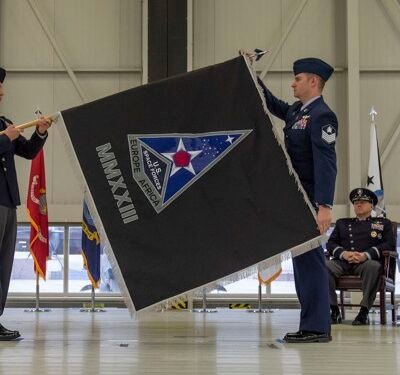The U.S. Space Force has opened a new office to serve Europe and Africa’s warfighting commands, as military officials stress the power of space-based systems in Ukraine and modern warfare.
The group will respond to the regions’ urgent space needs and streamline communications from the Space Force to the commanders of U.S. European Command and Africa Command. The office will be led by Space Force Col. Max Lantz, staffed by about 30 guardians, and cover 51 European countries and territories and 54 African nations.
This will simplify “how European and African militaries can interface with the U.S. Department of Defense on space-related issues. They will now have a dedicated access point singularly focused on the space domain,” Lantz told reporters Friday after the activation ceremony at Ramstein Air Base in Germany, where SPACEFOREUR-AF will be headquartered.
The Space Force opened its first office inside a regional command at U.S. Indo-Pacific Command at the end of last year, followed by U.S. Central Command and U.S. Forces Korea. These are part of the service’s effort to “normalize” how space is integrated into combatant commands, said Chief of Space Operations Gen. Chance Saltzman.
Malign countries interfering with the “flow of information from space” is the No. 1 space-based threat the U.S. is seeing in the region, Saltzman said.
The new component will support EUCOM’s need for space-based capabilities like satellite navigation and communications. Saltzman emphasized the Space Force is already involved in the region, “with our support to Ukraine being most visible in this effort.”
Space systems helped disprove disinformation that was circulating after Russia’s invasion of Ukraine, said Air Force Lt. Gen. Steven Basham, deputy commander for EUCOM.
“What the space domain has been able to provide through its intelligence, surveillance, and reconnaissance capabilities is the ability to quickly verify the statements that Russia has made to counter those statements with actual time-stamped, factual footage and images. This is extremely important and that can be utilized either by military capabilities or commercial capabilities, but we need to be able to make sure that we’re quickly ensuring that people around the world fully understand exactly what’s going on inside Ukraine,” Basham said.
The war in Ukraine has also put a fine point on how important the commercial space industry is—notably with SpaceX’s Starlink internet terminals, Lantz said.
“At the beginning of the war, the Ukrainians really had minimal use of space, especially integrated into their military. But within a matter of a week or two, they were one of the more powerful nations from a space-use perspective because they were able to, quite frankly, take a credit card or receive support from other nations and attain commercial capabilities. Starlink is the cutting edge of communications from a resiliency standpoint and has been a game changer for the Ukrainians,” he said.
And for Africa, in addition to military implications, harnessing satellites in space could increase stability in the region, said U.S. Marine Corps Gen. Michael Langley, commander for USAFRICOM. Satellites can look across thousands of miles on the continent and gather information on changes in climate patterns to monitor a host of humanitarian concerns, Langley said.
“They need that capability and sharing of how they can use satellites to monitor and predict the next crop failure, the next famine outbreak…so this is the one domain that’s going to add to the stabilization, and hopefully in years, add to the prosperity of African countries,” Langley said.









